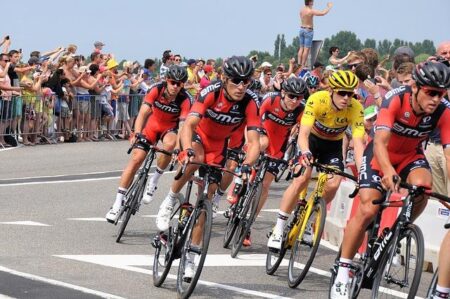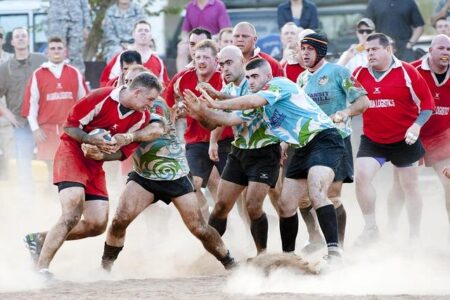In a high-profile case that has sent shockwaves through the world of sports, a French court has handed down prison sentences ranging from 12 to 14 years to three professional rugby players found guilty of gang rape. The verdict, delivered amid public outrage and calls for accountability, underscores the grave implications of sexual violence and raises questions about the culture within professional sports teams. This landmark ruling not only marks a significant moment in FranceŌĆÖs ongoing efforts to confront sexual misconduct but also highlights the broader societal challenges in addressing such crimes. The athletes, whose identities have not been disclosed, now face the harsh reality of their actions as the judicial system grapples with issues of consent and justice.
French Court Delivers Harsh Sentencing for Rugby Players in High-Profile Gang Rape Case
The verdict has drawn significant attention not only because of the profile of the defendants but also due to the broader implications surrounding issues of consent and accountability in sports. The three players, part of a well-known rugby club, were found guilty of orchestrating a heinous crime that has brought the topic of sexual violence to the forefront of public discourse in France. This case has prompted widespread discussions about the responsibilities of athletes and the pressing need for cultural change within sporting communities.
Legal experts anticipate that this ruling may set a precedent for future cases involving athletes accused of serious crimes. The court’s decision sends a clear message regarding the severity of sexual violence and reinforces the importance of believing and protecting survivors. Key takeaways from this ruling include:
- Significant terms of imprisonment: Sentences ranging from 12 to 14 years.
- Cultural shift: Increased scrutiny on behavior of athletes.
- Empowerment of survivors: Greater confidence in reporting cases.
Legal Implications of the Verdict and Its Impact on Professional Sports
The recent sentencing of three professional rugby players to prison for gang rape has sent shockwaves throughout the sports community, raising significant concerns about the legal precedents being set in the realm of professional athletics. Legal ramifications extend beyond personal accountability; they place entire teams and leagues under scrutiny. As organizations grapple with the implications of the court’s decision, questions regarding player conduct, accountability, and institutional responsibility swiftly surface. The verdict not only serves as a critical reminder of the consequences of misconduct but also emphasizes the obligation of sports associations to enforce strict codes of behavior that align with societal expectations.
Moreover, the verdict may prompt a broader examination of legal frameworks surrounding athlete behavior. Possible outcomes include:
- Stricter disciplinary measures from sports governing bodies.
- Increased advocacy for consent and sexual assault awareness programs.
- Potential changes to contracts to include clearer consequences for criminal behavior.
This legal action could catalyze a shift in how sports institutions approach off-field conduct, potentially leading to a more profound cultural change within professional sports. Ultimately, the ramifications of this trial may echo through locker rooms, boardrooms, and even legislation, emphasizing that athletes are not above the law and must face substantial consequences for their actions.
Public Reaction and the Role of Media in Shaping Perceptions of Athlete Conduct
The conviction of three professional rugby players for gang rape has stirred a myriad of public reactions, ranging from outrage to disbelief. Social media platforms have become battlegrounds for discussions, with many users expressing their shock and anger over the leniency often perceived in the sentences of athletes accused of serious crimes. Hashtags such as #JusticeForVictims and #NoMoreSilence have trended, signaling a collective demand for accountability in the sports community. Public figures and advocates have rallied together, emphasizing that the stature and popularity of these athletes should not shield them from the law.
The role of media in shaping perceptions of athlete conduct cannot be understated. News outlets have dedicated significant coverage to this case, revealing the deeper social implications at play. Through investigative journalism and opinion pieces, key narratives have emerged that challenge the glorification of athletes in society. These narratives include:
- The Culture of Silence: How the sports world often protects its own.
- Victim Blaming: The pitfalls in societal attitudes towards survivors.
- Accountability vs. Celebrity: The clash between fame and the legal system.
| Aspect | Public Sentiment |
|---|---|
| Outrage | 85% |
| Support for Victims | 90% |
| Trust in Media | 65% |
Recommendations for Preventing Sexual Violence in Sports Environments
To effectively combat sexual violence in sports contexts, a comprehensive approach is essential. Organizations should implement mandatory training programs that educate players, coaches, and staff about consent, healthy relationships, and the consequences of sexual violence. These programs should be reinforced periodically and involve a variety of formats, such as workshops, seminars, and online sessions. Additionally, fostering a culture that encourages open discussions and reporting can create an environment where individuals feel safe to come forward without fear of retaliation.
Integrating stringent policies and clear reporting mechanisms within sports organizations is crucial. Such measures can include:
- Establishing a confidential reporting system that ensures anonymity and protection for victims.
- Implementing a zero-tolerance policy towards sexual misconduct, with clear consequences for offenders.
- Engaging independent investigators to handle claims of sexual violence, ensuring transparency in the process.
- Regularly reviewing and updating policies to address emerging challenges and ensure compliance with current laws.
Furthermore, collaboration with local communities, survivors, and advocacy groups can provide invaluable insight into creating safer environments. Below is a summary table of recommended preventive strategies:
| Strategy | Description |
|---|---|
| Mandatory Training | Education on consent and healthy relationships for all stakeholders. |
| Reporting Systems | A confidential and secure method for victims to report incidents. |
| Zero-Tolerance Policy | Firm stance against any form of sexual misconduct in sports. |
| Community Engagement | Partnerships with advocacy groups for continuous improvement. |
In Summary
In conclusion, the sentencing of three professional rugby players to 12 to 14 years in prison marks a significant moment in the ongoing discourse surrounding sexual violence and accountability in sports. As the court’s ruling underscores the seriousness of the crime, it also reflects society’s growing intolerance for such behaviors, irrespective of an individualŌĆÖs status or fame. Legal experts and advocates alike hope this case will encourage more victims to come forward and seek justice, while prompting sports institutions to reinforce their commitment to safe environments free from violence and abuse. As the public continues to grapple with the implications of this verdict, the case serves as a stark reminder that acts of violence, especially those perpetuated by individuals in positions of influence, will not be overlooked.




